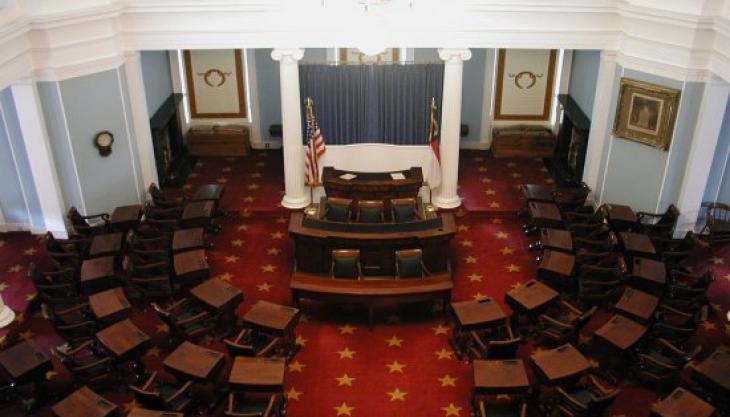How North Carolina's Stingy Unemployment Compensation Could Force You Into Bankruptcy
Submitted by Rachel R on Tue, 07/08/2014 - 12:08pm

North Carolina lawmakers cuts to unemployment are crushing consumers
Image source: Flickr Creative Commons User Government & Heritage Library of NC
North Carolina's legislators have added insult to the injury of unemployment by severely slashing UI compensation to the jobless. This time last year, the state cut the maximum weekly benefit from $535 down to $350 and then cut the number of weeks you could receive payments from 26 down to 20. And based on the law, as of July 1, the payout term for unemployment maxes out at just 14 weeks. This leaves NC with the worst unemployment compensation in the country.
This will leave many hit by long-term unemployment financially devastated and will likely force more into bankruptcy. And this isn't just guesswork – there's statistical science behind this statement. A study published by the Federal Reserve Bank in Richmond in its Economic Quarterly Volume showed that unemployment insurance and bankruptcy serve as counter-measures to one another and how decreases in one will drive an increase in the other. But the question is, which is better for society?
Most Bankruptcy Filers Have Had Employment Struggles
It's true that the leading reason people file for bankruptcy is medical costs, but this is often overlaid with employment issues. Those with chronic illness may see hours lost, experience job loss or have problems keeping a job. Still others have job problems with no medical issues attached. In total, two-thirds of bankruptcy filers covered by the Federal Reserve study had experienced employment disruptions.
The Interrelation of Bankruptcy and Unemployment Compensation
The study resulted in five major findings on how bankruptcy and unemployment insurance impact each other and then, in turn, impact public aid (such as welfare) and the economy.
#1 Filing bankruptcy lowers the chance that consumers will have to seek public assistance such as welfare and other government-funded benefits.
#2 Reducing the weeks of unemployment insurance available increases bankruptcy filings.
#3 Ability to file bankruptcy encourages a longer-term even distribution of wealth by allowing overly burdened debtors to find relief and participate in the economy.
#4 Changes in unemployment insurance do not affect the distribution of wealth.
#5 Unemployment insurance is more important than bankruptcy to society.
What Do These Findings Mean?
When North Carolina drastically lowered unemployment benefits, they put consumers at higher risk for having to apply to public assistance programs and reduce their ability to participate in our local and national economy. This will cost the state money – perhaps as much or more than they were paying in unemployment compensation. And if the stingy unemployment policy persists, bankruptcy rates will likely rise in order to protect consumers from financial ruin caused by joblessness.
The last finding – that UI is more important than bankruptcy – is based on the premise that bankruptcy is also a form of social insurance because it protects consumers. These two programs are on an economic teeter-totter. If more consumers file bankruptcy, they should need less UI and if there is more UI available, fewer consumers should have to file bankruptcy. This is why NC legislators' relentless pursuit of lower UI compensation makes no sense when you step back and look at the big picture.
Lowering the benefits available to the jobless leaves a void. These consumers have living expenses, debts and bills to pay. When there isn't enough UI to supplement these expenses while the consumer searches for a new job, it creates a pile of debt. Bankruptcy can eradicate much of that debt pile, but then that means creditors that were owed don't get paid and that affects the economy and our state in turn.
The new UI law offers no solution for the debt spiral it causes – the legislation creates no new job opportunities to offset the cuts – the law creates more problems and solves none. The financial analysts at the Federal Reserve know it, those dealing with long-term unemployment know it, so why don't our NC lawmakers know it?
If you're deep in debt as a result of employment issues, bankruptcy can help you get a financial fresh start and on the road to recovery. Contact the law offices of John T Orcutt for a free consultation on how Chapter 7 or Chapter 13 debt relief can improve your life.
Debts Hurt! Got debt? Need help? Get started below!
Serving All of North Carolina
- Bankruptcy Attorneys Raleigh NC (North)
- Bankruptcy Attorney Fayetteville NC
- Bankruptcy Attorney Durham NC
- Bankruptcy Attorneys Wilson NC
- Bankruptcy Attorneys Greensboro NC
- Bankruptcy Attorneys Southport NC
- Bankruptcy Attorneys Wilmington NC
Bankruptcy Attorneys Raleigh NC (North)
6616 Six Forks Rd #203 Raleigh, NC 27615 North Carolina
Tel: (919) 847-9750

Bankruptcy Attorney Fayetteville NC
2711 Breezewood Ave Fayetteville, NC 28303 North Carolina
Tel: (910) 323-2972

Bankruptcy Attorney Durham NC
1738 Hillandale Rd Suite D Durham, NC 27705 North Carolina
Tel: (919) 286-1695


Bankruptcy Attorneys Greensboro NC
2100 W Cornwallis Dr. STE O Greensboro, NC 27408 North Carolina
Tel: (336) 542-5993

Bankruptcy Attorneys Southport NC
116 N Howe St. Suite A, Southport, NC 28461 North Carolina
Tel: (910) 218-8682

Bankruptcy Attorneys Wilmington NC
116 N. Howe Street, Suite A Southport, NC 28461 North Carolina
Tel: (910) 447-2987
